Filter by
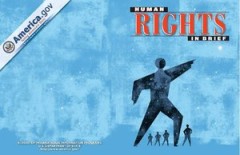
Human Rights in Brief
In all civilized nations, attempts are made to define and buttress human rights. The core of the concept is the same everywhere: Human rights are the rights that one has simply because one is human. They are universal and equal. The following pubilcation gives an overview of human rights across the globe.
- Edition
- -
- ISBN/ISSN
- -
- Collation
- -
- Series Title
- -
- Call Number
- 900 DEP h
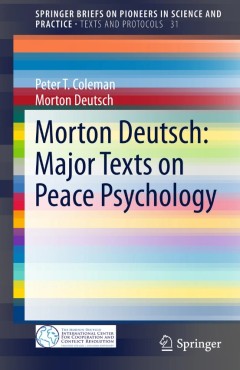
Morton Deutsch: Major Texts on Peace Psychology
Commemorating Morton Deutsch’s 95th birthday, this book presents ten major texts by this highly respected social psychologist on war and peace. This second volume presents Deutsch in his role as a leading social science activist on issues of war and peace – writing papers, making speeches and participating in demonstrations. After serving in the U.S. Air Force during World War II and being …
- Edition
- 1
- ISBN/ISSN
- 978-3-319-15442-8
- Collation
- XIII, 167
- Series Title
- SpringerBriefs on Pioneers in Science and Practice
- Call Number
- -
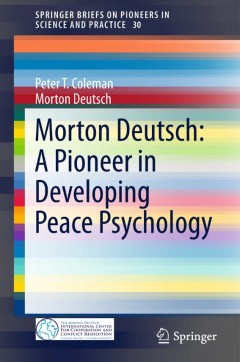
Morton Deutsch: A Pioneer in Developing Peace Psychology
Commemorating Morton Deutsch’s 95th birthday, this book presents ten major texts by this highly respected social psychologist on war and peace. This first volume presents Deutsch in his role as a leading social science activist on issues of war and peace – writing papers, making speeches and participating in demonstrations. After serving in the U.S. Air Force during World War II and being a…
- Edition
- 1
- ISBN/ISSN
- 978-3-319-15439-8
- Collation
- XVI, 139
- Series Title
- SpringerBriefs on Pioneers in Science and Practice
- Call Number
- -

The Theory of New Classical Macroeconomics A Positive Critique
This book examines new classical macroeconomics from a comparative and critical point of view that confronts the original texts and later comments as a first dimension of comparison. The second dimension appears in a historical context, since none of the new classical doctrines can be analyzed ignoring the parallelism and discrepancies with the theory of Keynes, Friedman or Phelps. Radicalism o…
- Edition
- -
- ISBN/ISSN
- 978-3-319-17578-2
- Collation
- -
- Series Title
- -
- Call Number
- -

The Synthetic Nitrogen Industry in World War I Its Emergence and Expansion
This concise brief describes how the demands of World War I, often referred to as the Chemists’ War, led to the rapid emergence of a new key industry based on fixation of atmospheric nitrogen. Then, as now, nitrogen products, including nitric acid, and nitrates, were essential for both fertilizers and in the manufacture of modern explosives. During the first decade of the twentieth century, t…
- Edition
- -
- ISBN/ISSN
- 978-3-319-19357-1
- Collation
- -
- Series Title
- -
- Call Number
- -

The Surgions Mate The First Compendium on Naval Medicine, Surgery and Drug T…
This book reproduces and comments John Woodall’s handbook which was used as standard text for medical treatment at sea in the seventeenth century and was the first instruction for medical service aboard on the whole. In 1612 the East India Company, founded in London 1600 and invested with special royal privileges and authority, appointed John Woodall as its first surgeon-general, who had g…
- Edition
- -
- ISBN/ISSN
- 978-3-319-25574-3
- Collation
- -
- Series Title
- -
- Call Number
- -

Money and Finance in Central Europe during the Later Middle Ages
The wealth of the Central European archives, particularly in urban records, has not been fully realised by Western European historians. However, the records are not always straightforward to use and many studies tackle the methodological problems inherent in gathering and analysing medieval sources. This book presents an original review of past and present research of national historiographies …
- Edition
- 1
- ISBN/ISSN
- 978-1-137-46022-6
- Collation
- XVIII, 269
- Series Title
- Palgrave Studies in the History of Finance
- Call Number
- -
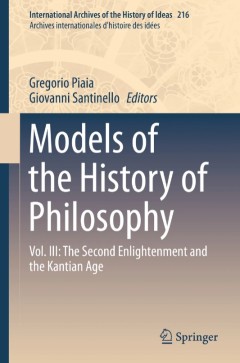
Models of the History of Philosophy:Vol. III: The Second Enlightenment and th…
This is the third volume of Models of the History of Philosophy, a collaborative work on the history of the history of philosophy dating from the Renaissance to the end of the nineteenth century. The volume covers a decisive period in the history of modern thought, from Voltaire and the great “Encyclopédie” of Diderot and d'Alembert to the age of Kant, i.e. from the histoire de l'esprit hu…
- Edition
- 1
- ISBN/ISSN
- 978-94-017-9965-2
- Collation
- XXXII, 1000
- Series Title
- International Archives of the History of Ideas Archives internationales d'histoire des idées
- Call Number
- -

The Sense of Things
This book proposes a new interpretative key for reading and overcoming the binary of idealism and realism. It takes as its central issue for exploration the way in which human consciousness unfolds, i.e., through the relationship between the I and the world—a field of phenomenological investigation that cannot and must not remain closed within the limits of its own disciplinary borders. The b…
- Edition
- -
- ISBN/ISSN
- 978-3-319-15395-7
- Collation
- -
- Series Title
- -
- Call Number
- -
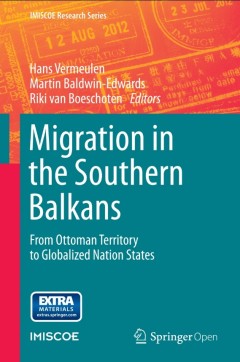
Migration in the Southern Balkans
This open access book collects ten essays that look at intra-regional migration in the Southern Balkans from the late Ottoman period to the present. It examines forced as well as voluntary migrations and places these movements within their historical context, including ethnic cleansing, population exchanges, and demographic engineering in the service of nation-building as well as more recent la…
- Edition
- 1
- ISBN/ISSN
- 978-3-319-13718-6
- Collation
- XI, 211
- Series Title
- IMISCOE Research Series
- Call Number
- -
 Computer Science, Information & General Works
Computer Science, Information & General Works  Philosophy & Psychology
Philosophy & Psychology  Religion
Religion  Social Sciences
Social Sciences  Language
Language  Pure Science
Pure Science  Applied Sciences
Applied Sciences  Art & Recreation
Art & Recreation  Literature
Literature  History & Geography
History & Geography